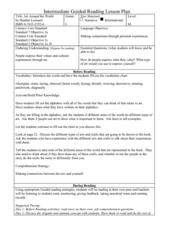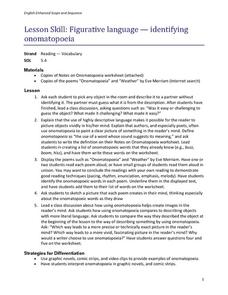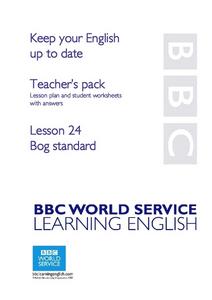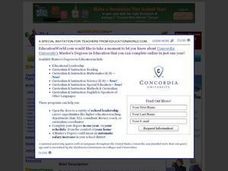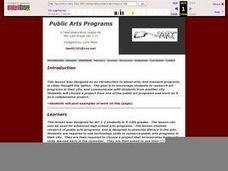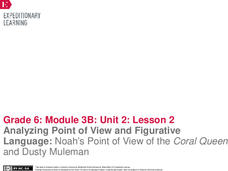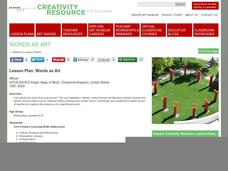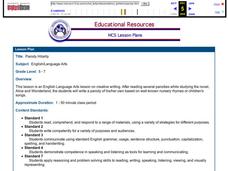EngageNY
End of Unit Assessment: Presentation of Position
What is the difference between formal and informal language? Pupils rewrite their position speeches to adapt them for an audience of adults. Next, they present their speeches in small groups, attempting to answer the question, "Which...
EngageNY
Grade 11 ELA Module 1: Unit 2, Lesson 8
How does Shakespeare employ figurative language to emphasize central ideas in Hamlet? Using an interesting resource, learners complete a Quick Write to answer the question. Additionally, they continue their study of the play by exploring...
EngageNY
Grade 10 ELA Module 4: Unit 2, Lesson 18
Macbeth describes life as a light and a candle, suggesting it is fleeting and meaningless. Using the resource, scholars engage in an evidence-based discussion and complete a Quick Write about Shakespeare's use of figurative language in...
EngageNY
Grade 11 ELA Module 2: Unit 1, Lesson 3
Go figure! Scholars examine the figurative language in the last half of W.E.B. Du Bois's work "Of Our Spiritual Strivings." They pay special attention to his metaphors and develop ideas with group discussion and guided questions....
Curated OER
Art Around the World
The non-fiction book Art Around the World by Heather Leonard serves as inspiration for learning how art reflects cultures and values. New vocabulary and background knowledge are fleshed out before reading the story. Afterward, the class...
Curated OER
Figurative Language- Identifying Onomatopoeia
A study of onomatopoeia for 5th graders is here for you. Pupils discover that the use of highly descriptive language makes it possible for readers to picture objects in their minds. After engaging in a class discussion and listening to...
PBS
Their Eyes Were Watching God: The Impact of Language
Author, filmmaker, and anthropologist Zora Neale Hurston was also a dialectologist. The dialogue of the characters in her novel Their Eyes Were Watching God reveals her fascination with accents and dialects. A short video from the Great...
Curated OER
Language Arts: Scavenger Word Hunt
Participate in a scavenger hunt to find objects beginning with a particular letter sound and take digital photos of them with your scholars. Using software, they find word pictures beginning with particular letters and locate picture...
Curated OER
Language Arts: Ode to the Ordinary
Eighth graders select ordinary objects, determine their uses, and write poems about them. Once they select an object, they create a web about its uses to serve as an outline. Once they have written their own odes, 8th graders meet in...
Curated OER
Language Arts: Stick Puppet Show
Young scholars create short stories and make stick puppets to act it out. After editing their stories, they glue used CDs or DVDs to popsicle sticks and decorate them as the story characters. Finally, students present their puppet shows...
Curated OER
Keep Your English Up to Date: Bog Standard
Explore the tendency of the English language to change by reviewing the British idiom "bog standard." An audio talk is accessible via hyperlink and questions and worksheets are included for learners. The lesson plan is a good way to work...
Curated OER
Ye Olde English Sayings
Discover the historical roots of modern English with your young learners, and then discover the meaning of many old English sayings. What a great chance to explore the history behind many of the words and phrases we use today!
Curated OER
The Study of Theme and Figurative Language in Poetry and/or Prose
Identify and analyze the use of figurative language used in select pieces of writing. These pieces of literature will represent at least two pieces by one writer and at least two pieces by different writers. This instructional activity...
Curated OER
Foreign Language Lip-Sync Karaoke Contest
Teach your class about foreign language through transcribing lyrics. They will transcribe the lyrics of a song in a foreign language and use the lyrics to create a cloze activity as they listen and speak the language with their...
Curated OER
Descriptive Writing: Using Art to Inspire description
Write with the senses! Try using art to inspire writers to consider all of the senses. Here, the class is divided in half. Each group looks at one of two images, imagines the senses that would be engaged, and records answers to five...
Curated OER
Public Arts Programs
Students choose a project from one of the public art programs and work on it as a collaborative project. The goal is to encourage students to research art programs in their city, and communicate with students from another city.
Pearson
Catching the Sun: Tales from Asia
Explore the folklore of Asia and the South Pacific with this language arts lesson series. Complementing a reading of Catching the Sun: Tales from Asia by Jan M. Mike, this resource supports learners with understanding cause and effect...
Scholastic
Quick as a Cricket Lesson Plan
Teaching young learners about similes is easy as pie with this primary grade language arts instructional activity. Following a class reading of the children's book, Quick as a Cricket by Audrey Wood, young readers learn the definition of...
EngageNY
Analyzing Powerful Language: Learning to Read
The power of a word. Readers learn the importance of word choice in shaping a text by using a Powerful Language T-chart to separate strong words and phrases from those that are more bland. They then complete a third read and question set...
EngageNY
Analyzing Point of View and Figurative Language: Noah’s Point of View of the Coral Queen and Dusty Muleman
Literally, what's the meaning? Scholars read pages seven through nine of Flush and discuss literal and nonliteral meaning with figurative language. Learners work in triads to identify and define unfamiliar words. They then complete a...
Denver Art Museum
Words as Art
Elementary schoolers look at images of the art installation, Wheel -which is found at the Denver Art Museum. After a class discussion about how the words and symbols on the artwork make it more meaningful, the discussion turns toward how...
Curated OER
Parody Hilarity
Upper grade and middle school writers study the art of parody. In this language arts lesson plan, learners study the work of Lewis Carroll, read and discuss parodies from the book, Alice in Wonderland, and construct their own parody...
Smith Family Home
Transportation
Here's an interesting lesson that combines elements of language arts, sociology, and a study of the many ways that people use transportation to get from one place to another. The eight-page plan includes worksheets and a word search that...
Curated OER
Vocabulary Building
A fabulous language arts lesson has readers focus on the vocabulary in the key words, expand and build new vocabulary, and practice three grammar concepts. They recognize key words as they relate to communicating at work. Pupils build...
Other popular searches
- English Language Arts
- English Language Arts Exam
- English Language Arts Games
- Deaf English Language Arts
- English Language Arts Music
- English Language Arts Heroes
- English Language Arts Skills
- English Language Arts Grade 3
- English/language Arts
- English Language Arts Poetry
- English Language Arts Rating=3
- English Language Arts Unit Sc






